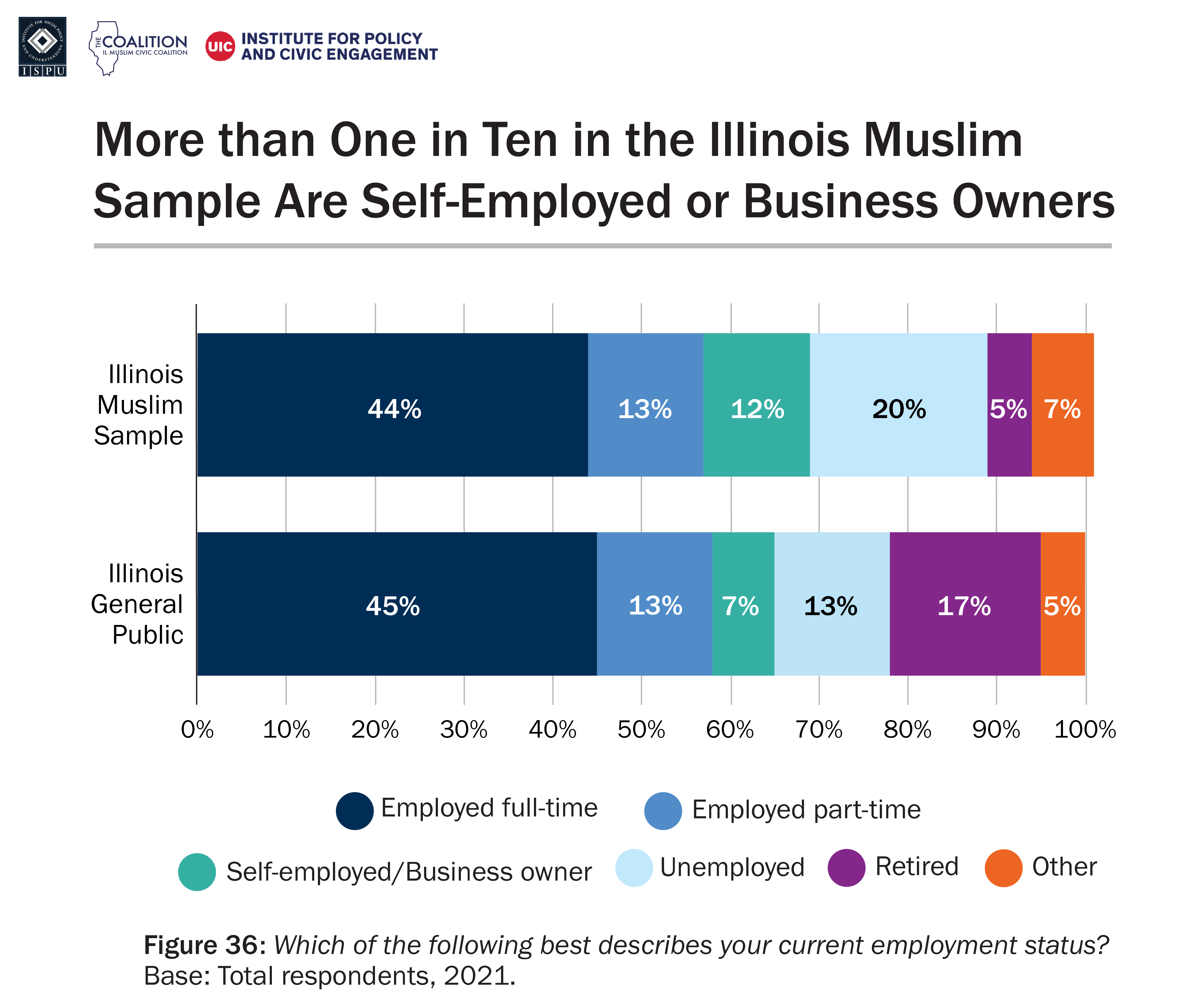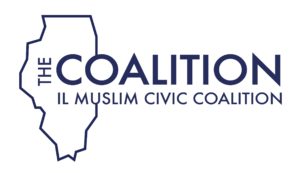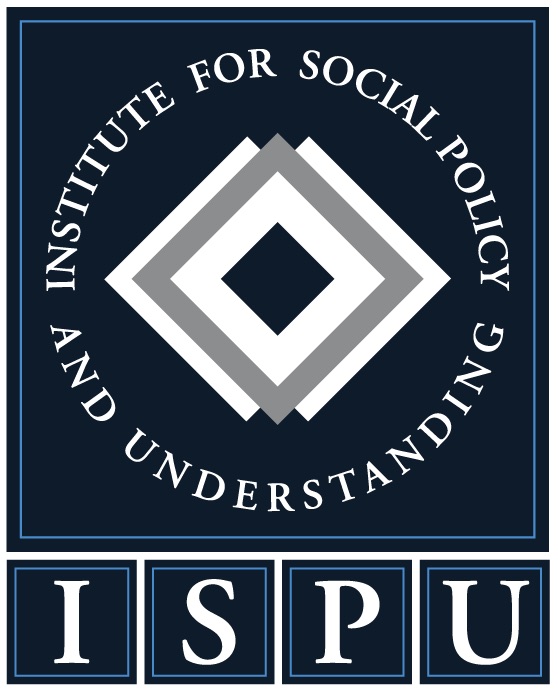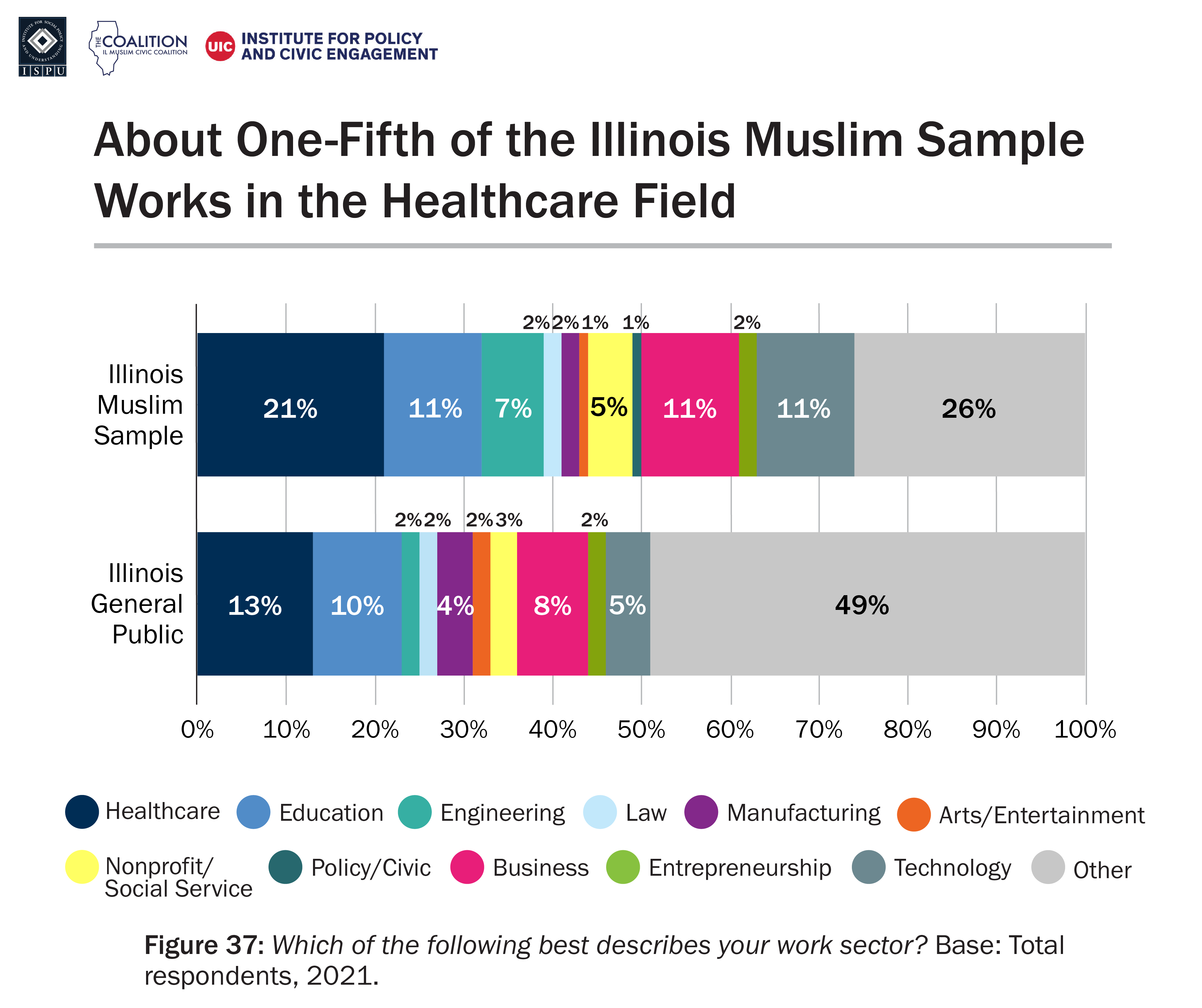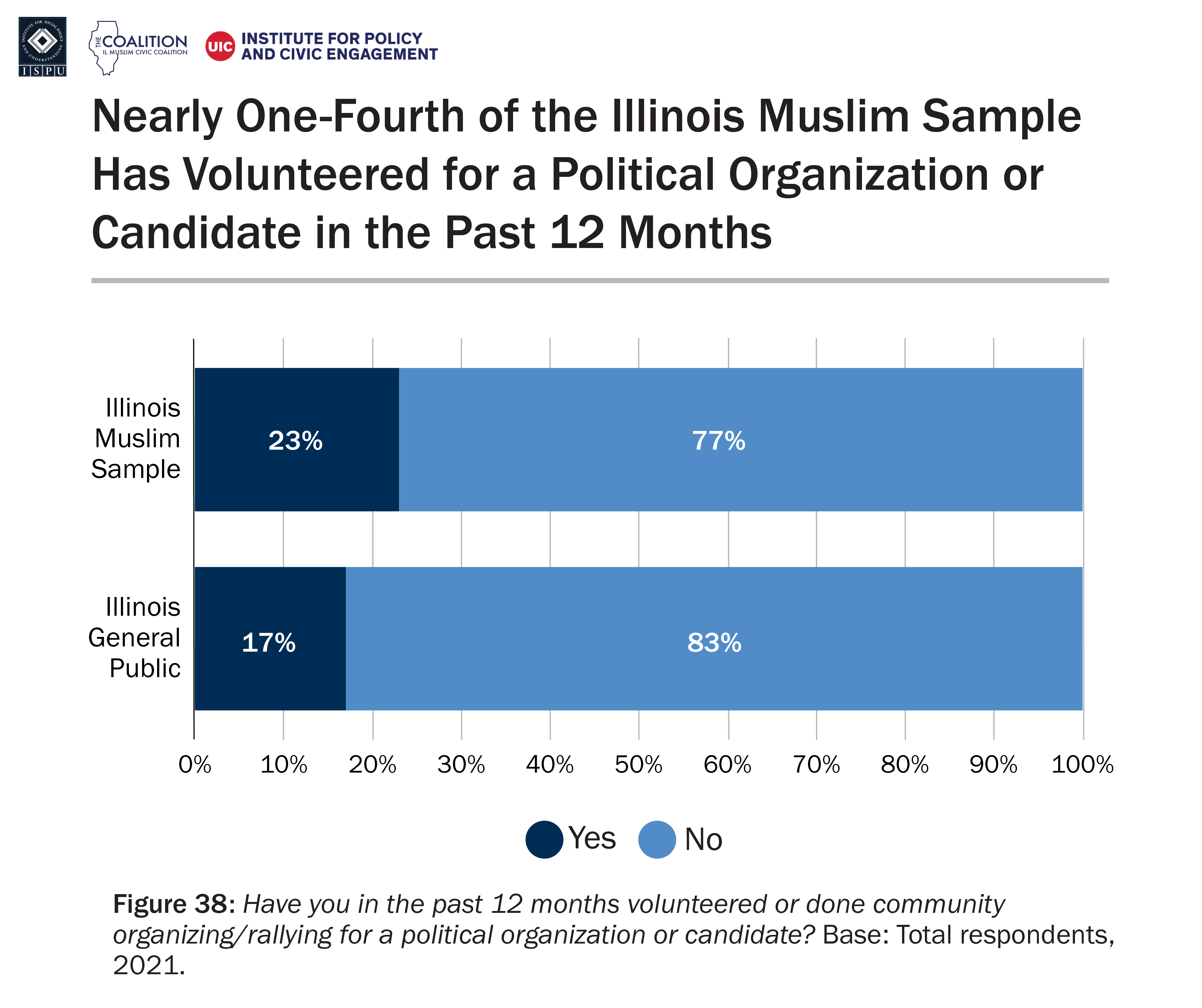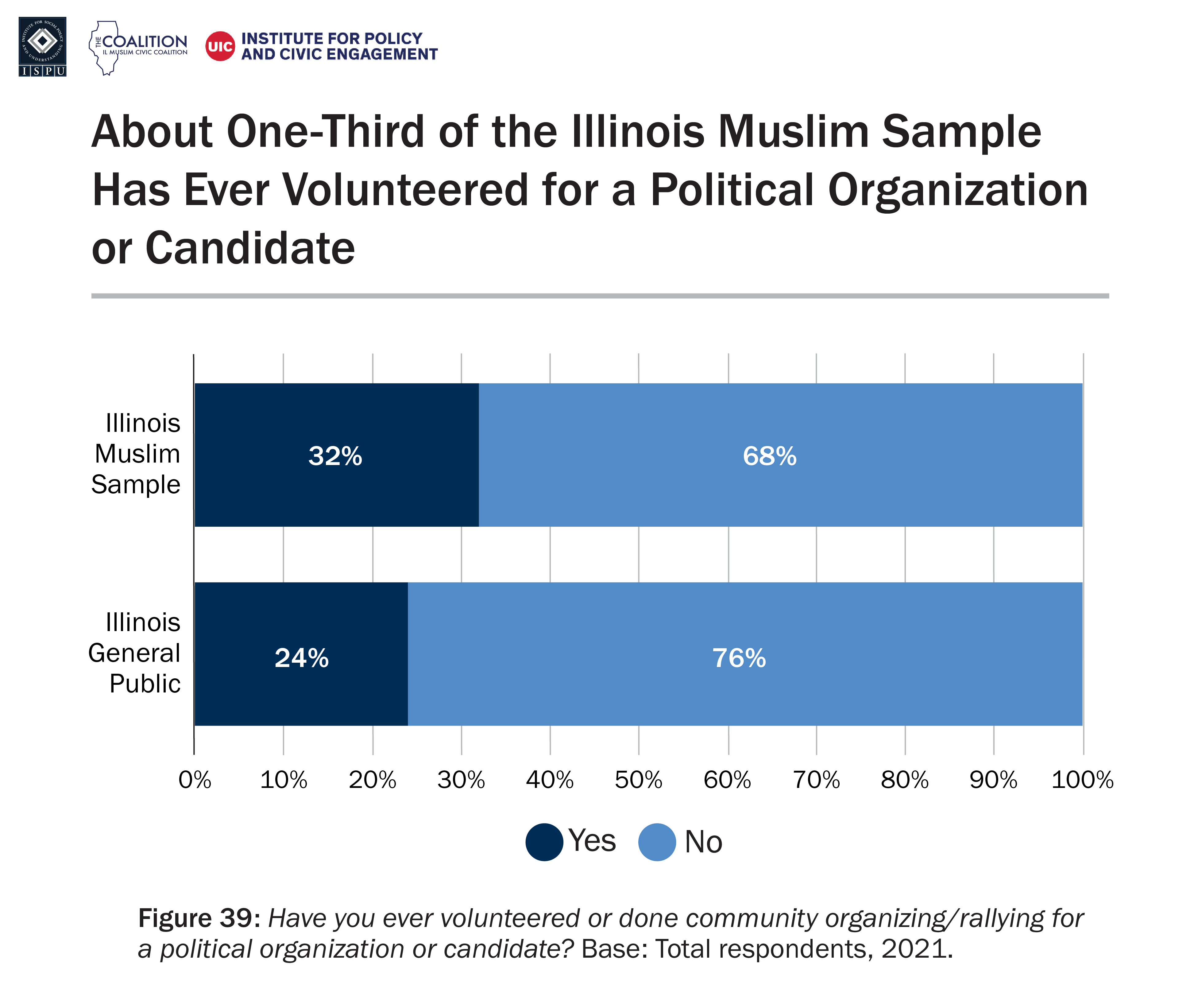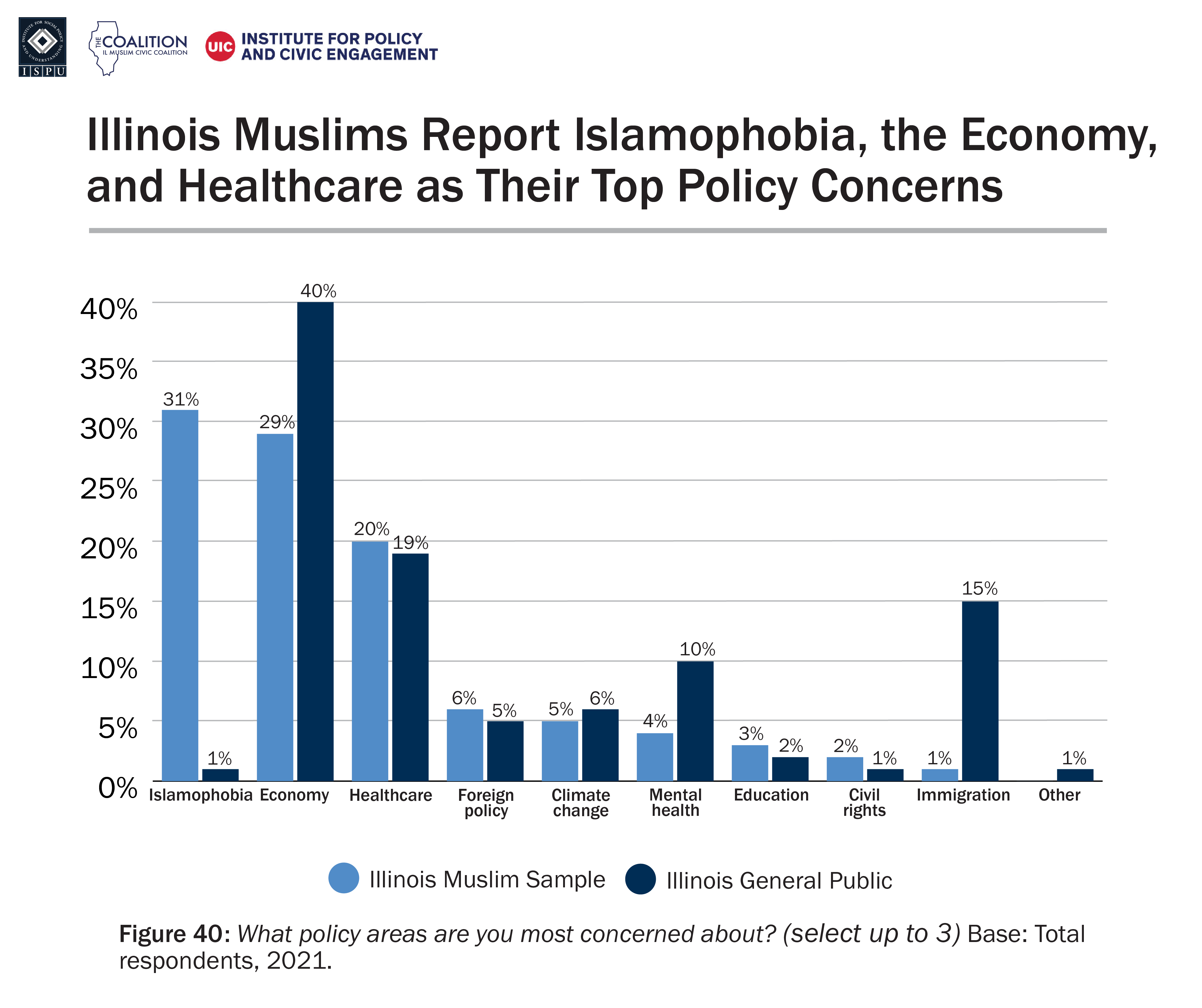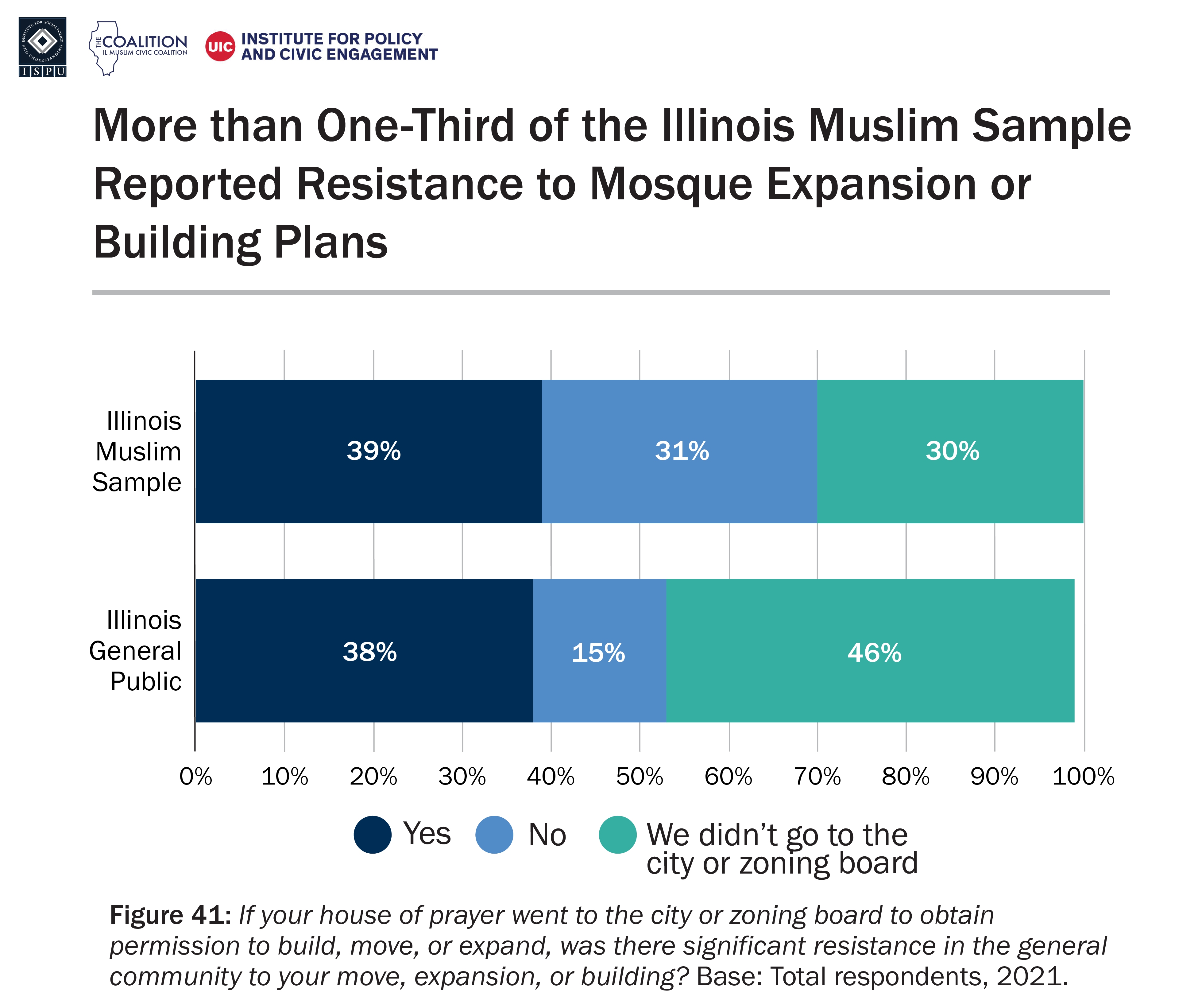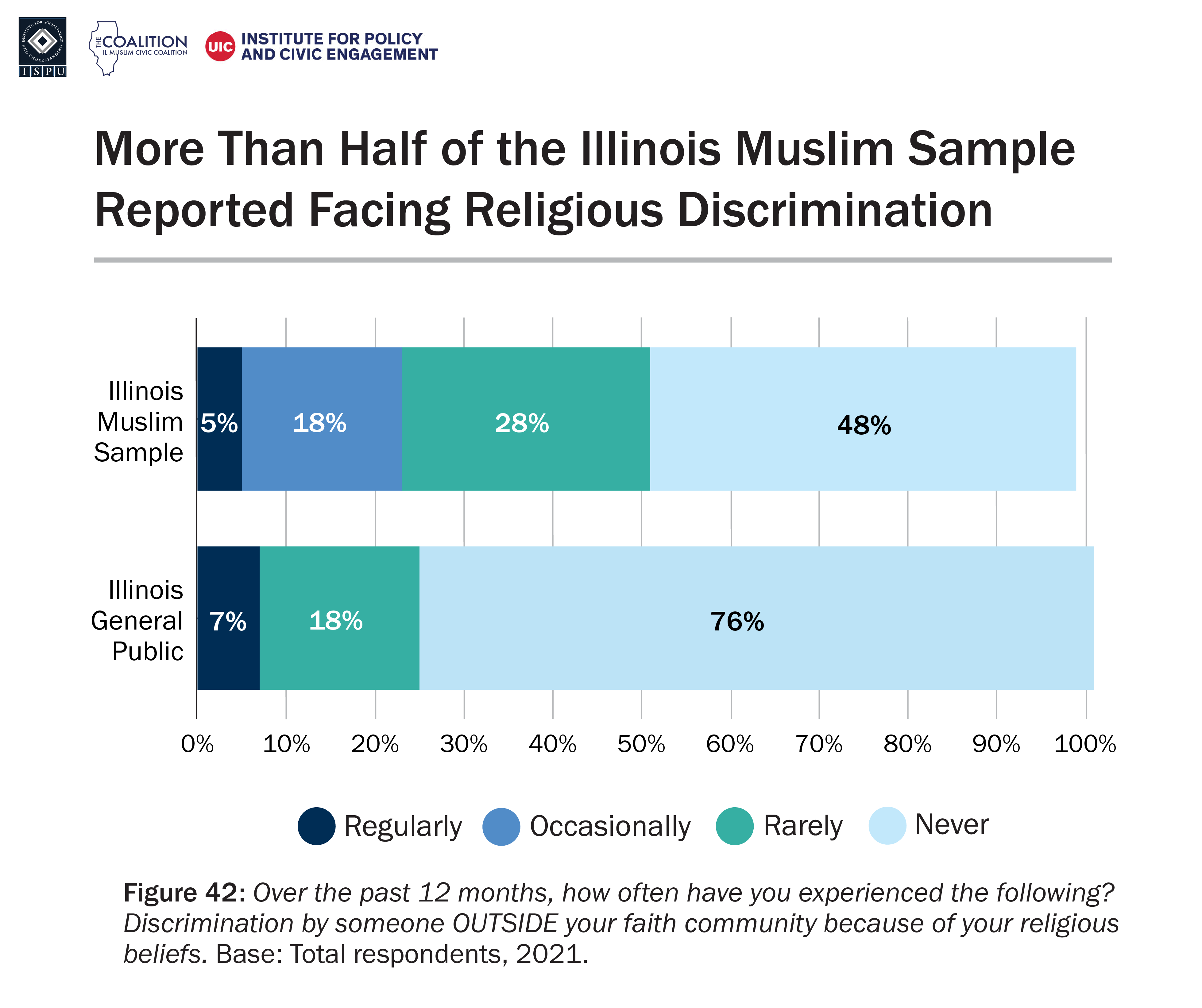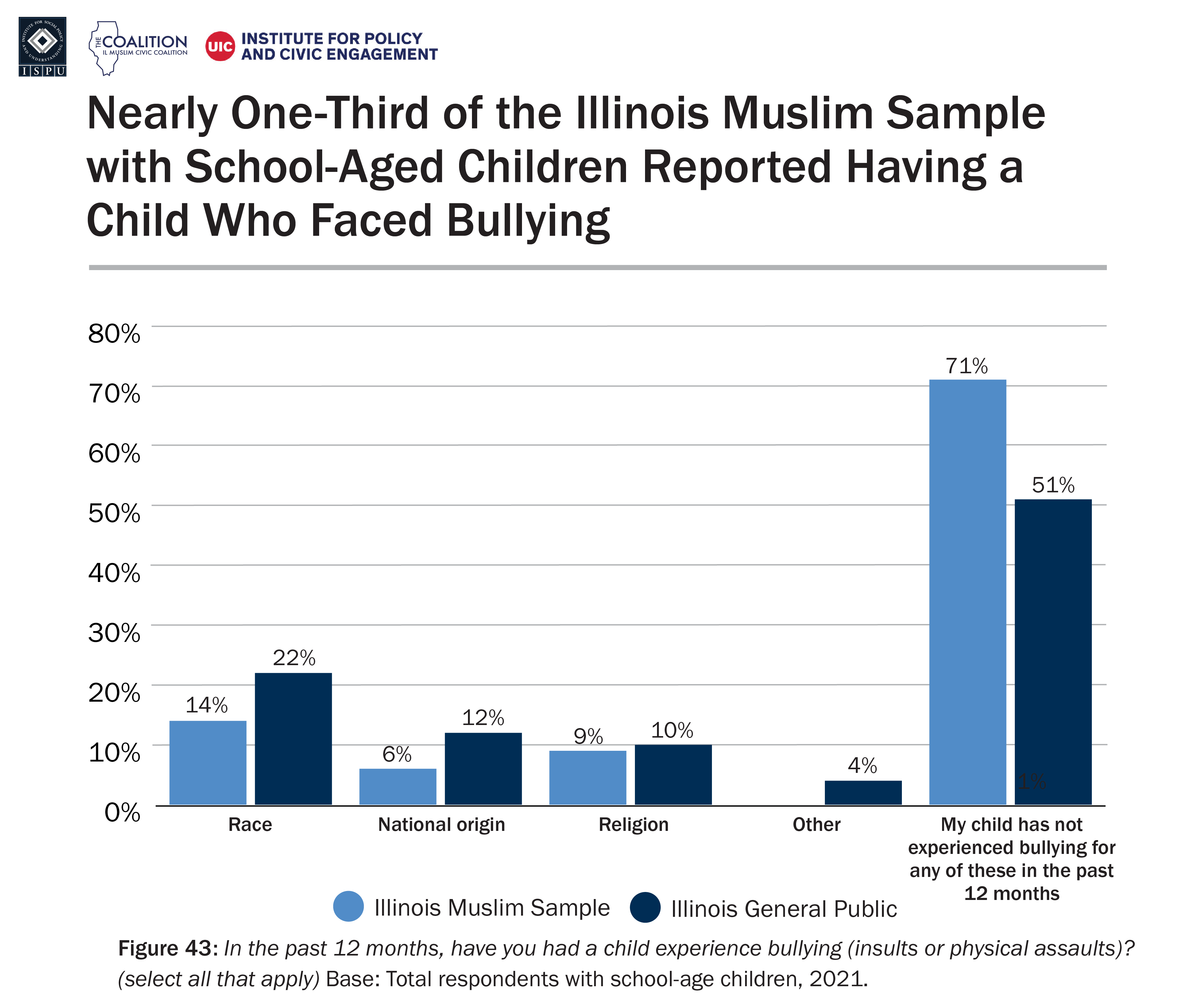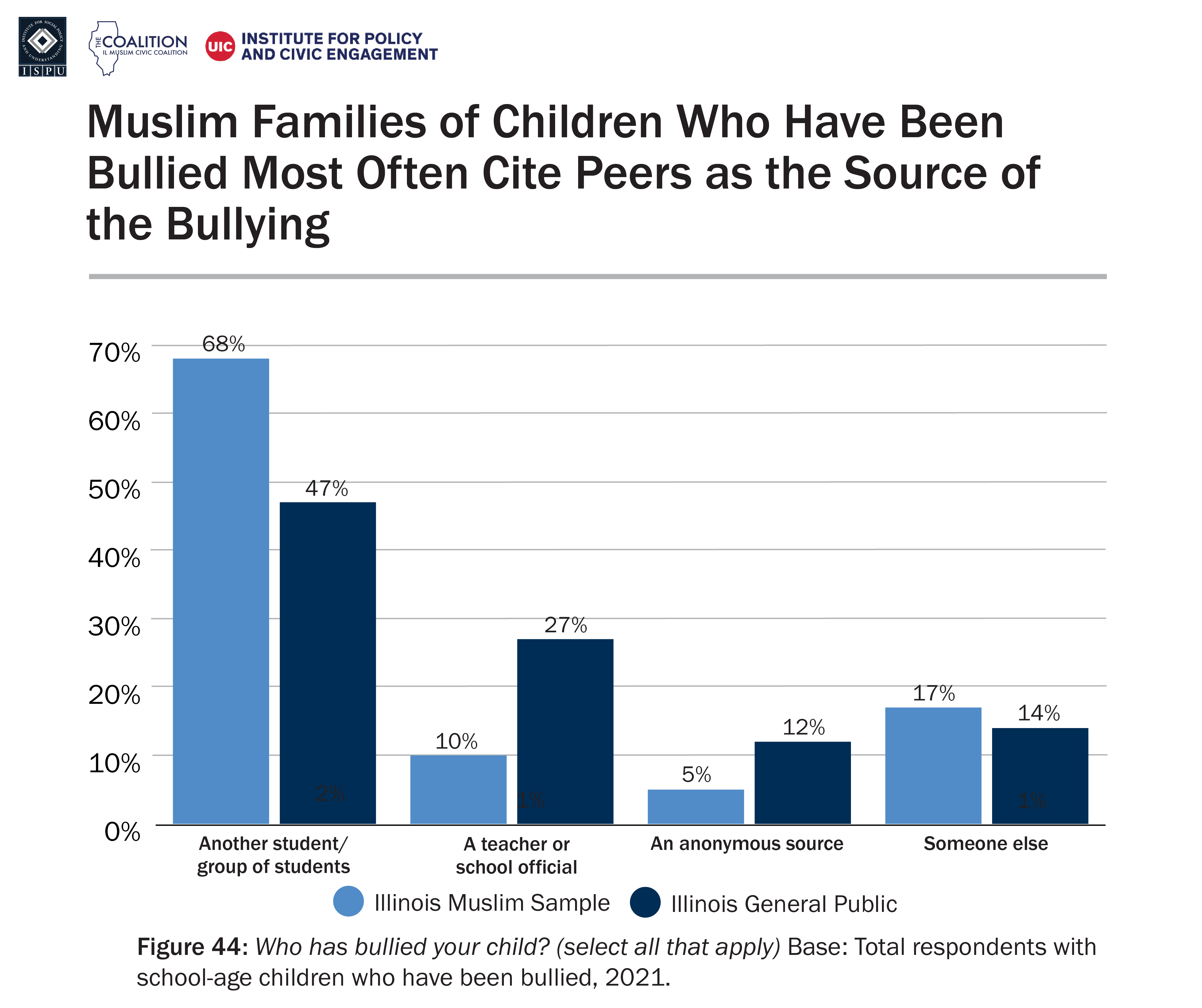.
Illinois Muslims
Needs, Assets, and Opportunities
JULY 28, 2022 | BY DALIA MOGAHED, DR. JOSEPH HOERETH, OJUS KHANOLKAR, AND UMAIR TARBHAI
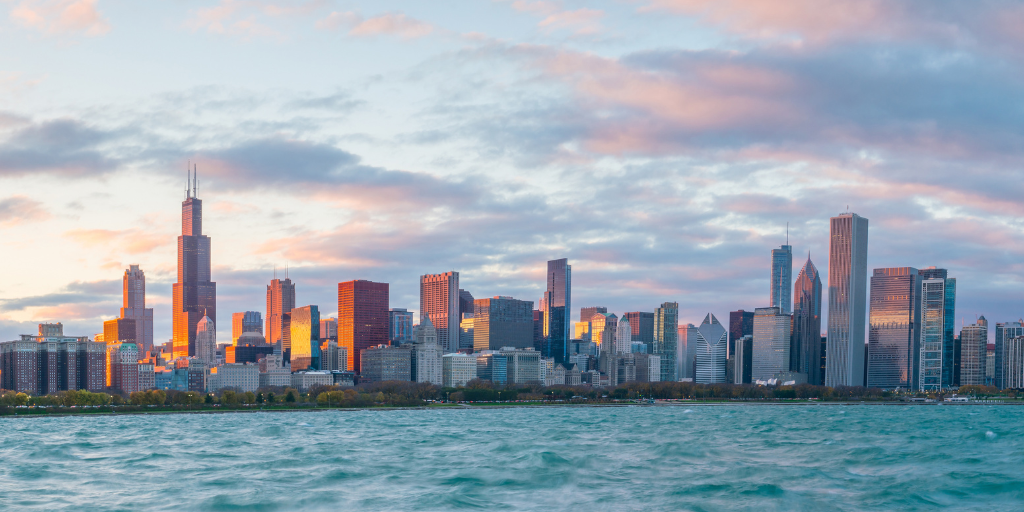
Results: Broader Society
Survey respondents were asked questions regarding the contributions of the Muslim community to the broader society, such as economic and civic contributions as well as questions about policy priorities. Related questions included topics such as business ownership and job creation; sectoral employment; civic engagement activities; policy priorities and concerns; and external religious discrimination.
ASSET: Illinois Muslims Create Jobs
Around 12% of Muslim respondents identify as self-employed, compared with 7% of Illinois general public respondents. As part of our survey, we asked people who reported being self-employed or owning a business how many people they employed. By using this data and projecting to the entire population of Illinois Muslim adults [10], estimated to be 220,000, we find that Muslims in Illinois create more than 350,000 jobs–that’s nearly 6% of all jobs in Illinois while Muslims make up only 2.8% of the population. However, it is also important to note that 20% of Muslims in our sample are unemployed, which presents a need.
DOWNLOADS
TABLE OF CONTENTS:
Page 1: Executive Summary, Report Overview
Page 2: Introduction, Results: Demographics
Page 3: Results: Individual
Page 4: Results: Family, Results: Community
Page 5: Results: Broader Society, Recommendations and Opportunities

DOWNLOADS
TABLE OF CONTENTS:
Page 1: Executive Summary, Report Overview
Page 2: Introduction, Results: Demographics
Page 3: Results: Individual
Page 4: Results: Family, Results: Community
Page 5: Results: Broader Society, Recommendations and Opportunities
Results: Broader Society
Survey respondents were asked questions regarding the contributions of the Muslim community to the broader society, such as economic and civic contributions as well as questions about policy priorities. Related questions included topics such as business ownership and job creation; sectoral employment; civic engagement activities; policy priorities and concerns; and external religious discrimination.
ASSET: Illinois Muslims Create Jobs
Around 12% of Muslim respondents identify as self-employed, compared with 7% of Illinois general public respondents. As part of our survey, we asked people who reported being self-employed or owning a business how many people they employed. By using this data and projecting to the entire population of Illinois Muslim adults [10], estimated to be 220,000, we find that Muslims in Illinois create more than 350,000 jobs–that’s nearly 6% of all jobs in Illinois while Muslims make up only 2.8% of the population. However, it is also important to note that 20% of Muslims in our sample are unemployed, which presents a need.
ASSET: Diverse Expertise
In terms of type of work, one-fifth of the of the Muslim sample (21%) reported they work in healthcare. Eleven percent stated they work in each of the following categories: Education, Business, and Technology (that wasn’t engineering). In addition, around 50% of Muslim respondents reported that they had an annual income that was greater than $100k before taxes. Twenty percent made between $25k and $50k, and around 31% of respondents made between $50k and $100k. In the Illinois general public sample, by comparison, 21% made below $25k, 27% made between $25 and $50k, and 16% made above $100k. This discrepancy in income was also reflected in the rates at which social welfare programs were accessed in the Muslim sample vs. the Illinois general public sample. ISPU national surveys show that roughly 35% of Muslims make $30,000 or less while 18% make $100K or more, suggesting our sample overrepresents the rich and underrepresents the poor. We took this into account as we analyzed the data and addressed it in our focus groups.
ASSET: Strong Civic and Political Engagement
Roughly nine in 10 Muslims (92%) are eligible to vote, which is similar to the Illinois general public sample (98%). Ninety-one percent are registered or planning to register with 75% of respondents registered and 16% planning to register. In comparison, 92% of the Illinois general public sample are registered to vote and 6% intend to register. The demographic among the Illinois Muslim sample that plans to register (16%) is an important opportunity for civic organizations to increase voter turnout within the Muslim population in Illinois, especially with the upcoming elections.
However, despite having a lower voter registration rate, the Muslim sample showed slightly higher rates of deeper civic engagement, such as volunteering, compared to the Illinois general public. About a quarter (23%) of Muslim respondents have volunteered for a political candidate in the past 12 months alone, compared to 17% of Illinois general public respondents.
Moreover, about a third (32%) of Muslim respondents have volunteered for a political candidate at some point in their lives, compared with 24% of Illinois general public respondents. This engagement extends to communication with elected officials even after the election is over. Roughly 30% of Muslim respondents stated they have contacted their federal elected officials, and the same report contacting their local elected officials in the last year. This is similar to the general public where 23% and 25% of Illinois general public respondents, respectively, said the same. This trend is seen nationally as well; nationally, Muslims are more likely to attend town hall meetings (22%), compared with Jews or Catholics (both at 18%) [11].
Muslim respondents shared similar policy priorities as the general public, with some unique differences. These priorities are important for elected officials to understand in order to meet the needs of their Muslim constituents. The economy was among the top three policy concerns among 29% of Muslim respondents and 40% of members of the general Illinois public. After that was healthcare, which 20% of Muslim respondents and 19% of Illinois general public chose as a top concern. It is to be noted that 6% of Muslim respondents said that foreign policy was a big issue for them, as did 5% of Illinois general public respondents. Perhaps not surprisingly, 31% of Muslim respondents said that Islamophobia was a top issue for them, while only 1% of Illinois general public respondents rated it as one of their top concerns.
NEED: Mosque Opposition Remains a Challenge
When comparing the experiences of Muslim faith groups with other faith groups in terms of creation of spaces of worship, more than one-third (39%) of respondents in the Muslim sample reported that their house of worship experienced significant resistance within their local community to move, build, or expand their mosque. Interestingly, a similar percentage of the general public reported the same challenge. However, the general public was more likely to not have a need to seek permission, with 46% of Illinois general public respondents stating that they did not seek approval from the city or zoning board, compared to 30% of the Muslim sample. This suggests that Muslims are not more likely than Illinois residents of other faiths to face city or zoning board resistance when building or expanding their house of worship but are also more likely to face the situation of needing to seek permission, perhaps due to a more rapidly growing community. This may present an opportunity for greater interfaith cooperation when faith communities are seeking to build or expand their houses of worship. To learn more about the resistance Muslim communities sometimes face when seeking to build or expand their house of worship, see ISPU’s report Countering Anti-Muslim Opposition to Mosque and Islamic Center Construction and Expansion.
NEED: Religious Discrimination
Muslim respondents reported significant religious discrimination from outside their faith community, which has repercussions ranging from public health, to employment, to political representation and needs to be an important focus for government and non-government organizations tasked with ensuring equal rights. While 52% of Muslim respondents stated they faced religious discrimination outside of their community, 24% of Illinois general public respondents said they have faced religious discrimination.
Discrimination poses a significant challenge to the Illinois Muslim community and was a consistent theme among focus group respondents, as noted in their policy priorities. There was quite a bit of variety within this theme, ranging from the most specific sort of discrimination directly targeted at Muslims, to discrimination directed toward immigrant communities or racial and ethnic groups that included Muslims, such as African Americans and, more specifically, African American Muslims. A less consistent but also present theme was discrimination within the Muslim community, particularly interethnic and interracial discrimination.
“In my view the greatest challenge is Islamophobia which is causing a security issue for Muslims. Being an Imam, we had to hire a security guy to protect us… It is hard for me when we have a security guy who is armed. He must be present at the door when people come to worship and it’s hard to see him when children come and they ask why he has to be here… Just to have him we feel insecure. When will we feel safe again to go back to normal?” – White male focus group participant
“Racism. Anti-black racism. Clear cut between African American Muslims and Muslims from South Asia. Family is from Sudan. We identify as black; we are African. Being in that space, I’m aware of the fault lines. Anti-black racism and racism in general: class division between aspiring middle class/upper class life in the US and the values connected to that. Lack of solidarity with working class people across racial and religious grounds. Biggest fault lines.” – African American focus group participant
NEED: Hate Crimes
Muslim respondents were just as likely as the Illinois general public respondents to be victims of hate crimes (9% vs. 10% respectively). These results point to the need for greater support for all vulnerable communities against bias-inspired crimes and an opportunity for coalition building.
NEED: Bullying
Forty-one percent of Illinois Muslim sample respondents stated they have a child between kindergarten and twelfth grade. Of those respondents with school-age children, 80% stated their child attends a public school, 10% attend a private non-Muslim school, and the remaining 11% attend a Muslim school.
Just as a significant portion of adults in the Illinois Muslim sample report facing discrimination, the children of Muslim respondents face bullying. Specifically, 29% of Muslim respondents who have a child in K-12 stated their child has experienced some form of bullying. By contrast, 49% of Illinois general public respondents with a child in K-12 stated their child has been bullied. It is worth noting that national data shows that 50% of Muslims have experienced religious-based bullying, as opposed to 27% of the general public [12]. Among Muslim respondents, 14% stated their children were bullied because of their race, 6% said national origin, and 9% said religion.
Finally, it was found that Muslim respondents’ children who were bullied were most often bullied by their own peers (68%) while 10% said a teacher did the bullying and 5% said the bullying was anonymous.

Recommendations and Opportunities
The survey and focus group results presented in this report describe a vibrant and diverse Muslim community in Illinois—a community that brings tremendous assets to Illinois’ civic, economic, and cultural spheres, yet also has important and urgent needs. Based on the assets and needs identified in this research, we offer the following recommendations for specific stakeholders.
Funders/Philanthropists
-
- Recognize community diversity and service to all marginalized and often invisible residents. Invest equitably in Muslim-led nonprofits based on demographics and needs.
- Invest in social services supporting Muslim communities, especially related to culturally appropriate family safety, elder care, poverty alleviation, accessibility, addiction and affordable health and mental health care services.
- Invest in ‘nontraditional’ and, therefore, underfunded Muslim-led nonprofits such as research and civic organizations.
- Focus on racial equity by recognizing the racialized nature of Islamophobia and supporting efforts to combat it among the general public and within schools, hospitals, and other public and private institutions.
- Leverage community generosity and capacity to donate, engaging with Muslim philanthropists to tackle pressing community challenges.
- Invest in civic engagement efforts to support full community participation in our democratic processes and institutions.
Educators
-
- Include implicit bias training related to Islamophobia and religious-based bullying awareness in staff cultural sensitivity training.
- Ensure educators have access to resources and experts within the Muslim community to better understand and serve our diverse students.
- Partner with Muslim-led community organizations to provide halal options for Muslim students. Also note that all students can consume halal food, so switching to halal providers will address the needs of every student.
- Include information on Muslim contributions to the state of Illinois and the nation in curricula based on recently passed laws. Invite Muslim community members to present on career days and to host interns.
- Include information on accessing social services to low-income families in school materials to ensure every child has access to nutritious meals and is ready to learn.
- Raise awareness about recently passed laws addressing faith-based equity to ensure no discrimination based on faith. See https://www.ilmuslimciviccoalition.org/ for more information.
Direct Social Service Providers
-
- Increase outreach to Muslim communities regarding job training and employment support.
- Invest in affordable and culturally appropriate mental health support for Muslims.
- Invest in serving Muslims with disabilities, providing addiction prevention and treatment, supporting aging community members and their families, supporting divorcees, and addressing domestic violence and supporting victims.
- Educate disadvantaged members of the Muslim community on how to access government programs to alleviate food insecurity and access employment support.
- Ensure better access and outreach, provide language access, and connect with trusted messengers and center the voices of Muslim-led organizations to lead this work.
Business Community
-
- Raise awareness in the business community about the Illinois Muslim chambers of commerce, Muslim-led businesses, and the Illinois Muslim community as job creators.
- Better understand and cater to the Muslim consumer who has strong disposable income and purchasing power.
- Understand halal as a healthy, ethical way of living.
- Provide more halal products and services to address the unmet needs of Muslim consumers, especially related to availability of halal food options on college campuses, halal financial options, and halal cultural activities.
- For Muslim business leaders, leverage their collective economic and job-creating clout to advocate for those with less privilege with policymakers (see ISPU’s Strategies to Increase Effective Political Engagement Case Study as an example).
Muslim Community Leaders and Members
-
- Invest in and support specialized faith, social, and civic organizations to address specific needs. The Muslim community is large and diverse, and one or few organizations can no longer meet every need. There is no one voice in this diverse community, so intra-community collaboration and coalition-building is critical between races, ethnicities, genders, etc.
- Mosque leadership should seek ways to better hear and address the opinions of all congregants, including women, young people, and Black Muslims (see ISPU’s research on Reimagining Muslims Spaces).
- Address intra-Muslim racism with education on the impacts and history of white supremacist ideas.
- Leverage the Muslim business community as job creators to address Muslim unemployment in Illinois.
- Invest in community-based resources providing affordable and culturally appropriate mental health support.
- Increase awareness of the Muslim Mental Health Directory.
- Invest in and support services and organizations serving people with disabilities, providing addiction prevention and treatment, supporting aging community members and their families, supporting divorcees, and addressing domestic violence and supporting victims.
- Engage in civic engagement efforts through support and partnership to build community participation and influence.
- Support and educate the community about Laws that empower and help change the narrative about the Muslim Community.
Government and Policymakers
-
- Ensure Muslim experts are at the table when policy is being made, not after it’s already developed.
- Increase and sustain outreach to Muslim constituents and communities, in all their diversity, and understand and address needs.
- Engage Muslim business leaders as job creators and an economic engine for the state.
- Engage Muslim healthcare professionals as a brain trust for health policy in Illinois.
- Invest in social services supporting Muslim communities, especially related to culturally appropriate family safety, elder care, poverty alleviation, accessibility, addiction, and affordable health and mental health care services.
- Muslims vote, contribute, and engage in the political landscape. Ensure Muslim representation grows in elected office. This will ensure communities are integrated and even more engaged in civic society.
- Understand bias/discrimination/Islamophobia, where it comes from, how it manifests, and the role of political rhetoric in both inflaming and dampening it.
- Include Muslim communities in racial equity programming and outreach.
Allies, Advocates, and Practitioners
-
- Recognize the presence of and seek education about Muslim communities, their contributions, and the impact of Islamophobia and discrimination. Consider diversity training for board, staff, and others involved to ensure cultural competency.
- Amplify the voices of Muslim advocates and community leaders seeking equity and partner with them for greater impact.
- Organize and speak up against local efforts to disenfranchise Muslim communities, such as in the form of mosque opposition, as one example.
- Partner with Muslim-serving organizations to combine forces for greater impact and culturally appropriate services and programs.
- Access expertise in the Muslim community for advisors, boards, and commissions in every sector, not just for faith or religious needs. Muslims are clearly experts in healthcare, business ownership, education, etc.
- Ensure that your own and/or your organization’s programs take into account the unique needs of Muslim communities and their diverse populations.
Future Researchers
-
- Further research that robustly examines the perspectives of Black Muslims.
- Further research that focuses on the needs of economically disadvantaged Muslims in Illinois.
- Greater exploration of the health care needs of Muslim patients, especially why they are less likely than the general public to receive care when they need it.
- Deeper dives into some of the issue areas discussed in this report to understand their contributing and mitigating factors and uncover evidence-based solutions to challenges identified.
- Further research on the mental health impact of the added cognitive and emotional labor of caring for parents and children at the same time.


